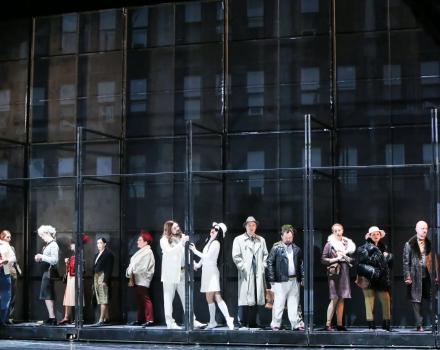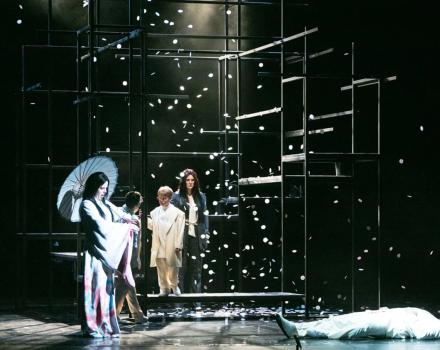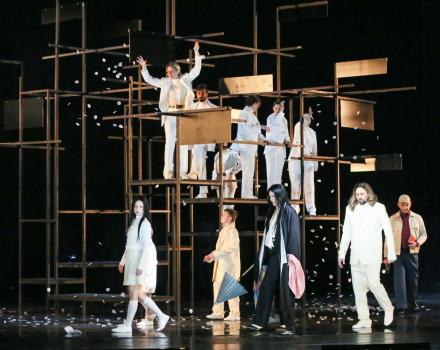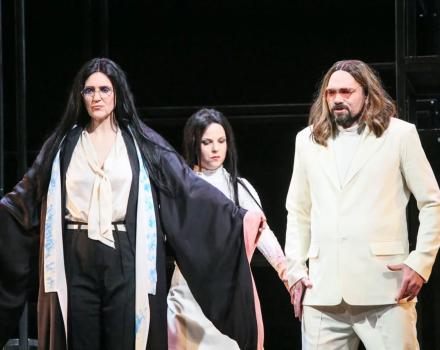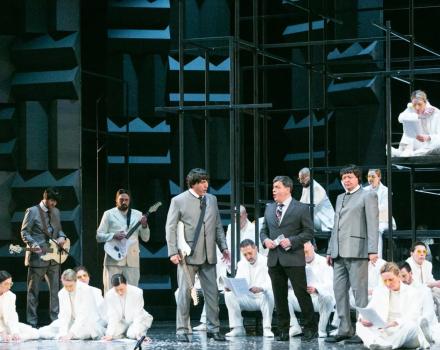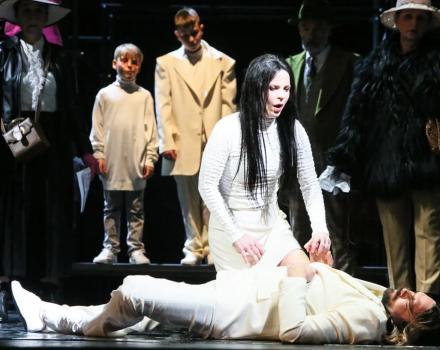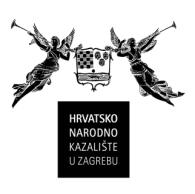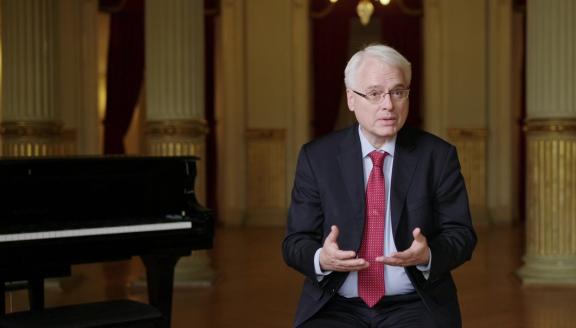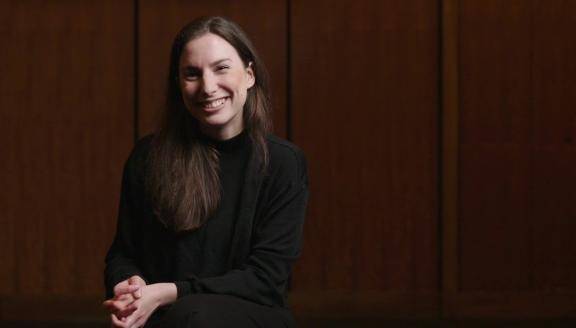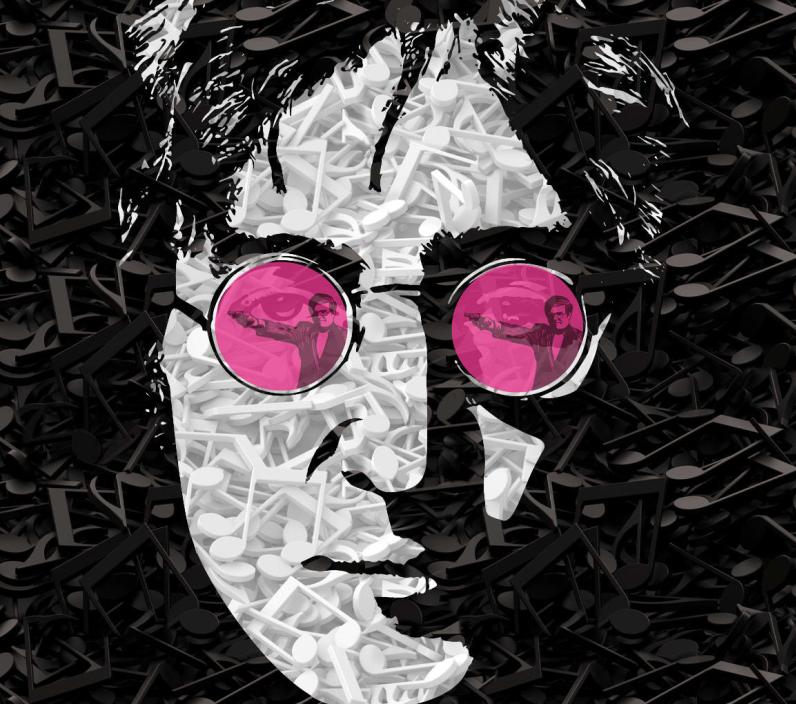
On 8 December 1980, a murder stirred the modern world. Britain’s most famous member of The Beatles was gunned down at the entrance to his residence in New York. What turned a fan into the killer of the man he adored?
Composer Ivo Josipović - and none other than Croatia’s former President - has had a very rich musical career alongside one in politics. He has written over 50 chamber music pieces for various instruments, chamber orchestra and symphony orchestra as well as serving as director of the contemporary music festival, Music Biennale Zagreb. The fate of John Lennon has intrigued the composer and with librettist Marina Biti, the pair have created an opera built around the last days of the Beatle, the people who were important to him and a psychological profile of his murderer. For the world premiere at the Croatian National Theatre in Zagreb, the conductor is Ivan Josip Skender and director Marina Pejnović.
Cast
|
John Lennon
|
Domagoj Dorotić
|
|---|---|
|
May
|
Dubravka Šeparović Mušović
|
|
Yoko Ono
|
Marija Kuhar Šoša
|
|
Chapman
|
Ozren Bilušić
|
|
Mimi
|
Kristina Anđelka Đopar
|
|
Julia, Count’s fiancée
|
Sofia Ameli Gojić
|
|
Cyntia
|
Helena Lucić Šego
|
|
Paul
|
Siniša Galović
|
|
Stu
|
Dario Ćurić
|
|
Ringo
|
Davor Radić
|
|
George
|
Siniša Hapač
|
|
Julian
|
Alen Ruško
|
|
Brian
|
Siniša Štork
|
|
Young Lennon
|
Borko Bajutti
Noa Vlčev
|
|
Dancers
|
Sanda Miš
Dunja Zoričić
Tatjana Andročec
Danijela Zobunđija
Danijela Batur
Azamat Nabiulin
Filip Filipović
|
|
Orchestra
|
Croatian National Theatre Zagreb Orchestra
|
|
Chorus
|
Croatian National Theatre Zagreb Chorus
|
| ... | |
|
Music
|
Ivo Josipović
|
|---|---|
|
Text
|
Marina Biti
|
|
Conductor
|
Ivan Josip Skender
|
|
Director
|
Marina Pejnović
|
|
Sets
|
Ivan Lušičić Liik
|
|
Costumes
|
Zdravka Ivandija Kirigin
|
|
Choreography
|
Barbara Novković Novak
|
|
Lighting
|
Elvis Butković
|
|
Chorus master
|
Luka Vukšić
|
|
Assistant conductor
|
Vjekoslav Babić
|
|
Assistant director
|
Patrik Sečen
|
| ... | |
Videos
Insights
Ivo Josipović - on the gestation of Lennon
Interview by Sanja Ivić
You have been preparing to write an opera about John Lennon for some years. Since you belong to a generation that (although very young at the time) had some experience of Beatlemania, did that inspire you or were you more driven by the murder of an icon?
Lennon's beautiful music was a catalyst in choosing the subject. But there are other key reasons. There is the phenomenon of the man, Chapman, who adored Lennon and ended up killing him. There are the intriguing interpersonal relationships between Lennon and the people he was close to: the Lennon-Yoko Ono-May triangle, his relationship with his mother and the relationships within the band. Lennon and the Beatles were icons of social rebellion for the young generation of the middle of the last century. Lennon was considered a dangerous and subversive person by the American secret services which caused problems for him. On the other hand, his criticisms of the establishment and advocacy for justice and peace were not unanimously approved. He was part of that same establishment through his lifestyle. Many fans resented him for this, some even renounced him and the entire band.
You made a brave decision to avoid any musical echoes of John Lennon's artistic legacy. Can you explain why?
The first reason is that Lennon wrote music in his specific style. For sure, I couldn't write such good Lennon-style music. After all, I have a recognisable style that I have developed, appreciated by those who follow contemporary music. Likewise, the use of Lennon's music, even if it were not literal quotes, is problematic ethically and legally. Is it right to collect points on the back of other people's music?
The plot of Lennon centres around the murder of the musician, with many flashbacks bordering on hallucinations, detailed snippets of memory that are loosely connected - all without a rigid time sequence. Did you start out with such a structure in mind? How much did Marina Biti's libretto influence the final form of the opera?
No, I didn't have a detailed plan from the beginning. For a long time, for more than a decade, I wanted to write an opera about the murder of Lennon, primarily motivated by the relationship between the killer and the victim. But those were only vague contours of the plot as I imagined it. I talked to several of our famous writers. Everyone wanted to do the libretto for my opera, but not Lennon. About a year and a half, two years ago, my mobile phone rang, and the pleasant voice on the other end introduced herself as professor Marina Biti from Rijeka. She says she has a draft of the libretto, am I interested. Of course, I said. I read the libretto and was delighted with the concept, and the text itself, which is great. Afterwards, we changed some things together, mostly shortening it because the text was too much for the agreed duration of the opera. But the final version has not lost any of its beauty and poetry. In fact, the entire plot takes place from the moment Chapman shoots Lennon, until the moment Lennon dies. During that time, Lennon, as if through fantasy and agony, recapitulates in his mind his relationships with the most important people in his life. Along with them, there is the killer Chapman. There are ten soloists, and the most important are the relationships that Lennon remembers: the John-Yoko-May triangle, the relationship with his mother, and the relationships in the band itself.
Score and libretto are the prerequisites for a theatrical performance but never just a copy of a template. A huge number of people participate in making a production, from the author's team and performers, all the way to the technicians who change the scenery. The position of the author is always challenging. Living authors are often divided between those who oversee every detail day and night and those who do not consciously get involved in the work process. In which group are you?
No matter what your take, the composer is still the one who makes a decisive contribution to the opera. Of course, the role of the conductor, director, soloist, choir and orchestra, costume designer, scenographer and many others is huge. I am extremely grateful to all of them for the great effort they put into making this opera a success. I worked very closely with maestro Ivan Skender, a conductor who, in addition to being a very successful composer, has the additional qualification of being a conductor of contemporary opera. I really wouldn't single anyone out, the enthusiasm in Croatian National Theatre is very impressive. Personally, I don't get involved in the work process. I will perhaps go to one of the last rehearsals, possibly for some suggestion that is important for the character of the opera. I respect the work and contribution of all participants and do not want to interfere in their work.
How do you manage the days before the premiere?
I am looking forward to the performance. Until the final result is seen on stage, no one can fully say what will happen at the performance itself. Of course, when it comes to the music, I know how it will sound, but I only perceive the other elements of the opera in a conversation with the participants of the opera. I am intrigued by the extraordinary interest of the audience in the performances. I hear that the tickets for both shows are sold out. I hope that there will be more performances.
Gallery
